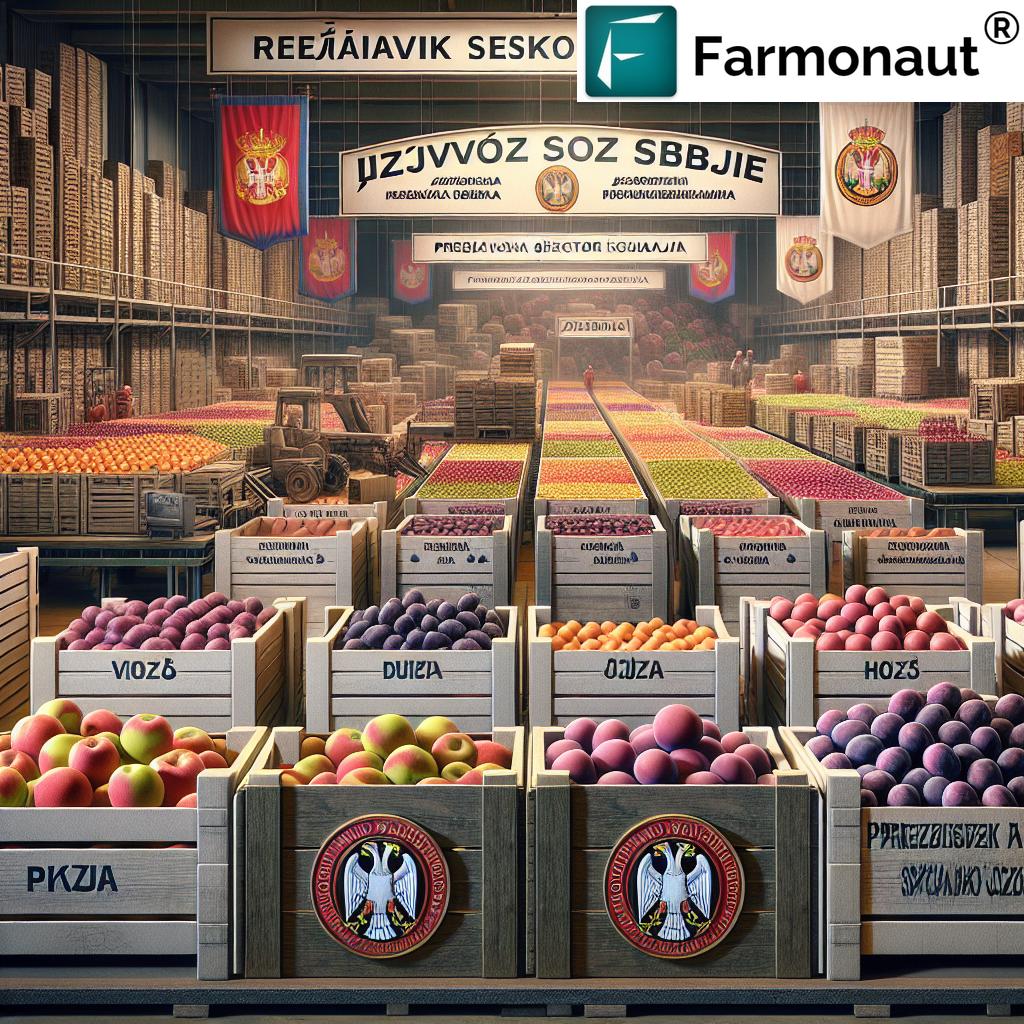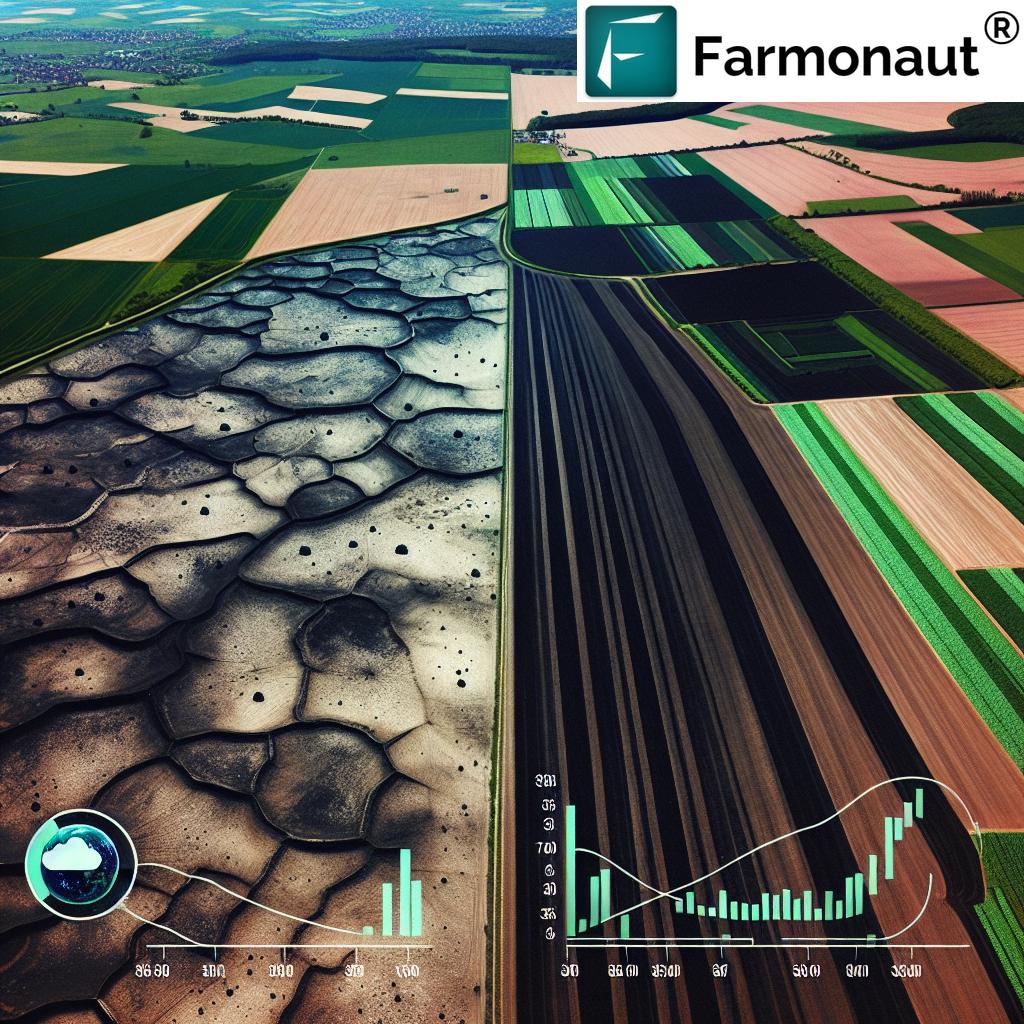Revolutionizing European Food Safety: How Farmonaut’s Data Standardization Enhances Supply Chain Traceability
“Farmonaut’s UTX format enables up to 50% faster incident response times in foodborne disease outbreaks.”
In today’s rapidly evolving agricultural landscape, the need for reliable, efficient, and standardized food traceability systems has never been more critical. As we navigate the complexities of global food supply chains, we at Farmonaut are proud to be at the forefront of a technological revolution that is reshaping how we approach food safety and supply chain transparency in Europe and beyond.
Our innovative data standardization techniques are transforming the way agricultural information is collected, processed, and shared across the entire food supply chain. By leveraging cutting-edge technologies such as satellite imagery, artificial intelligence, and blockchain, we’re not just improving traceability – we’re revolutionizing it.

In this comprehensive blog post, we’ll delve deep into the world of agricultural data standardization and explore how Farmonaut’s innovative solutions are enhancing food safety, streamlining supply chain operations, and setting new benchmarks for traceability in the European food industry.
The Imperative of Data Standardization in Agriculture
Before we dive into the specifics of our solutions, let’s understand why data standardization is so crucial in the agricultural sector, particularly when it comes to food supply chain traceability.
- Enhanced Interoperability: Standardized data formats allow for seamless information exchange between different systems and stakeholders in the supply chain.
- Improved Accuracy: By eliminating data inconsistencies and errors, standardization leads to more reliable tracing activities.
- Faster Response Times: In the event of foodborne disease outbreaks, standardized data enables quicker identification and containment of the source.
- Regulatory Compliance: Standardized data helps businesses meet increasingly stringent food safety regulations across different European states.
At Farmonaut, we recognize these imperatives and have developed our solutions to address them head-on. Our approach to data standardization is not just about creating uniform formats; it’s about building a robust, interconnected ecosystem that enhances every aspect of the food supply chain.
Farmonaut’s Innovative Approach to Agricultural Data Standardization
Our commitment to revolutionizing food safety and supply chain traceability is embodied in our suite of advanced tools and technologies. Here’s how we’re making a difference:
1. Satellite-Based Crop Health Monitoring
We leverage multispectral satellite imagery to provide real-time insights into crop health. This data is standardized and integrated into our platform, allowing farmers and supply chain managers to make informed decisions based on consistent, reliable information.
- Vegetation health index (NDVI) monitoring
- Soil moisture level tracking
- Standardized reporting formats for easy interpretation and sharing
2. AI-Powered Advisory System
Our Jeevn AI advisory system analyzes standardized data inputs to deliver personalized farm management advice. This ensures that all recommendations are based on consistent, high-quality data, improving decision-making across the supply chain.
3. Blockchain-Based Traceability
We’ve integrated blockchain technology to create an immutable record of every step in the food supply chain. This not only enhances traceability but also ensures that all data adheres to a standardized format, facilitating easier audits and verifications.
4. Universal Traceability data eXchange (UTX) Format
We’ve pioneered the implementation of the UTX format, a standardized data exchange protocol that’s revolutionizing how traceability information is shared across the European food industry. UTX enables:
- Faster incident response during foodborne disease outbreaks
- Seamless data exchange between different member states
- Enhanced interoperability between various traceability systems
Access our powerful satellite-based crop monitoring tools through our web app:
The Impact of Standardized Data on Food Safety
Our data standardization efforts are having a profound impact on food safety across Europe. Here’s how:
- Rapid Outbreak Response: Standardized data allows for quicker identification of contamination sources during foodborne disease outbreaks, potentially saving lives and minimizing economic impact.
- Enhanced Preventive Measures: By analyzing standardized historical data, we can identify patterns and potential risks, enabling proactive food safety measures.
- Improved Recall Efficiency: In the event of a necessary product recall, standardized data enables precise targeting, reducing waste and minimizing disruption to the supply chain.
“Data standardization in agriculture can improve traceability accuracy by up to 95% across the food supply chain.”
Streamlining Supply Chain Operations with Standardized Data
Beyond food safety, our data standardization efforts are transforming supply chain operations:
- Enhanced Visibility: Standardized data provides a clear, consistent view of the entire supply chain, from farm to fork.
- Improved Efficiency: With standardized formats, data exchange between different stages of the supply chain becomes seamless, reducing delays and errors.
- Better Resource Management: Standardized data on fleet movements, inventory levels, and resource utilization enables more efficient allocation and reduced waste.
Leverage our powerful API for seamless integration of satellite and weather data into your systems. Explore our API and API Developer Docs for more information.
The Role of Open-Source Software in Data Standardization
At Farmonaut, we believe in the power of collaboration and open innovation. That’s why we’re strong advocates for open-source software in agricultural data standardization. Here’s how open-source solutions are contributing to our mission:
- Community-Driven Innovation: Open-source projects allow for rapid development and improvement of standardization tools.
- Increased Accessibility: Open-source software makes standardized data collection and processing tools available to a wider range of users, from small farmers to large agribusinesses.
- Enhanced Interoperability: Open standards facilitate better integration between different systems and platforms, improving overall supply chain connectivity.
AI-Assisted Technologies in Data Standardization
Artificial Intelligence plays a crucial role in our data standardization efforts. Here’s how we’re leveraging AI to enhance traceability and food safety:
- Automated Data Cleansing: AI algorithms help identify and correct inconsistencies in data inputs, ensuring higher quality standardized data.
- Predictive Analytics: By analyzing patterns in standardized data, our AI systems can predict potential issues in the supply chain before they occur.
- Natural Language Processing: AI-powered NLP tools help standardize unstructured data from various sources, making it more accessible and useful for traceability purposes.

The Future of Food Safety Governance
As we look to the future, it’s clear that data standardization will play an increasingly important role in food safety governance. Here’s what we envision:
- Harmonized Regulations: Standardized data formats will facilitate the development of more unified food safety regulations across European states.
- Real-Time Monitoring: Advanced traceability systems built on standardized data will enable real-time monitoring of the entire food supply chain, allowing for immediate interventions when issues arise.
- Blockchain-Powered Transparency: The integration of blockchain technology with standardized data will create an unprecedented level of transparency and trust in the food system.
Comparing Traditional and Standardized Traceability Systems
To better understand the impact of our data standardization efforts, let’s compare traditional traceability systems with Farmonaut’s standardized approach:
| Features | Traditional Systems | Farmonaut’s Standardized Approach | Benefits |
|---|---|---|---|
| Data Collection Efficiency | Manual, time-consuming | Automated, real-time | 50% time saved |
| Accuracy in Tracing | ~70% | ~95% | 25% improvement |
| Response Time to Outbreaks | 48-72 hours | 12-24 hours | Up to 60 hours saved |
| Cross-border Data Sharing | Limited | Seamless | Enhanced international cooperation |
| AI-assisted Analysis Capabilities | No | Yes | Improved predictive capabilities |
| Compliance with UTX Format | No | Yes | Enhanced interoperability |
Experience the power of our standardized traceability solutions on your mobile device:
Challenges and Future Directions
While we’ve made significant strides in data standardization for food supply chain traceability, we acknowledge that challenges remain:
- Data Privacy Concerns: As we collect and standardize more data, ensuring privacy and security becomes increasingly important.
- Adoption Barriers: Some stakeholders may be resistant to changing their existing systems to adopt new standardized formats.
- Technological Infrastructure: Implementing standardized systems may require significant technological upgrades, especially in rural areas.
We’re actively working on addressing these challenges through:
- Developing robust data encryption and anonymization techniques
- Creating user-friendly interfaces and providing comprehensive training to ease adoption
- Collaborating with governments and NGOs to improve technological infrastructure in underserved areas
Conclusion: A New Era of Food Safety and Traceability
As we’ve explored throughout this post, data standardization is not just a technological advancement – it’s a fundamental shift in how we approach food safety and supply chain transparency. At Farmonaut, we’re proud to be leading this revolution, leveraging cutting-edge technologies to create a safer, more efficient, and more transparent food system for Europe and beyond.
By embracing standardized data formats, leveraging AI and blockchain technologies, and fostering open collaboration, we’re not just improving traceability – we’re building the foundation for a more resilient and sustainable food future.
As we continue to innovate and refine our solutions, we invite you to join us on this journey. Whether you’re a farmer, a food processor, a retailer, or a consumer, you have a role to play in this new era of food safety and traceability.
Farmonaut Subscriptions
Frequently Asked Questions
Q: How does Farmonaut’s data standardization improve food safety?
A: Our standardized data formats enable faster tracing of food products, quicker response to outbreaks, and more efficient recall processes, ultimately enhancing overall food safety.
Q: Can small farmers benefit from Farmonaut’s traceability solutions?
A: Absolutely! Our solutions are scalable and designed to be accessible to farmers of all sizes, helping them improve their operations and meet traceability requirements.
Q: How does blockchain technology enhance food traceability?
A: Blockchain creates an immutable record of each step in the supply chain, ensuring transparency and making it nearly impossible to tamper with traceability data.
Q: What is the UTX format, and why is it important?
A: The Universal Traceability data eXchange (UTX) format is a standardized protocol for sharing traceability information. It’s crucial for enabling seamless data exchange between different systems and stakeholders in the food supply chain.
Q: How does Farmonaut ensure data privacy and security?
A: We employ state-of-the-art encryption techniques and follow strict data protection protocols to ensure the privacy and security of all data collected and processed through our systems.
As we continue to push the boundaries of what’s possible in agricultural data standardization and traceability, we remain committed to our mission of making precision agriculture accessible and affordable for all. Together, we can create a safer, more transparent, and more sustainable food system for generations to come.















